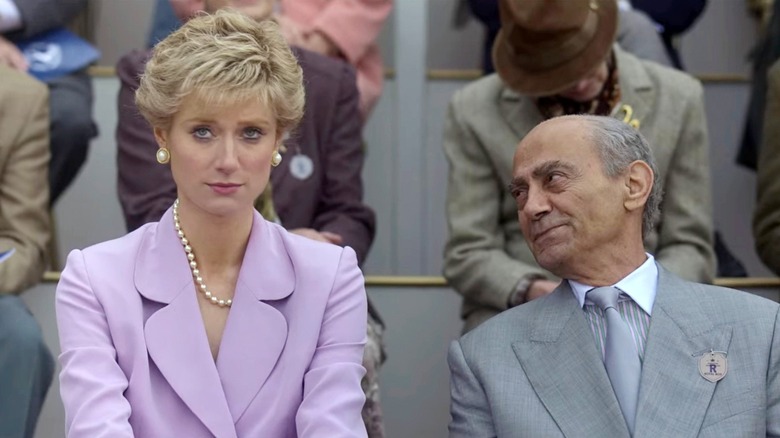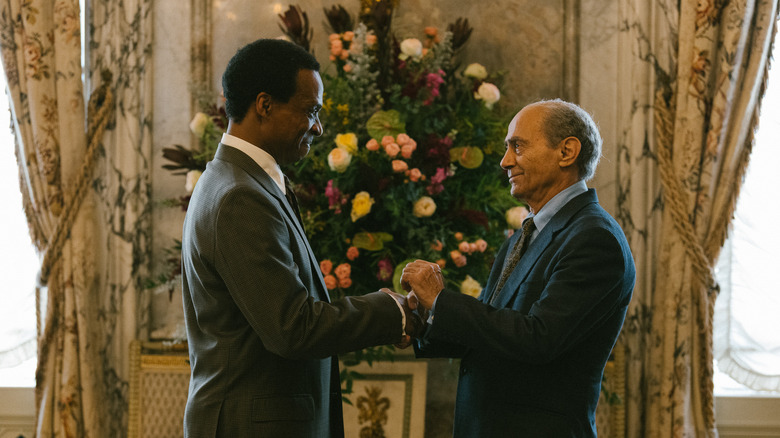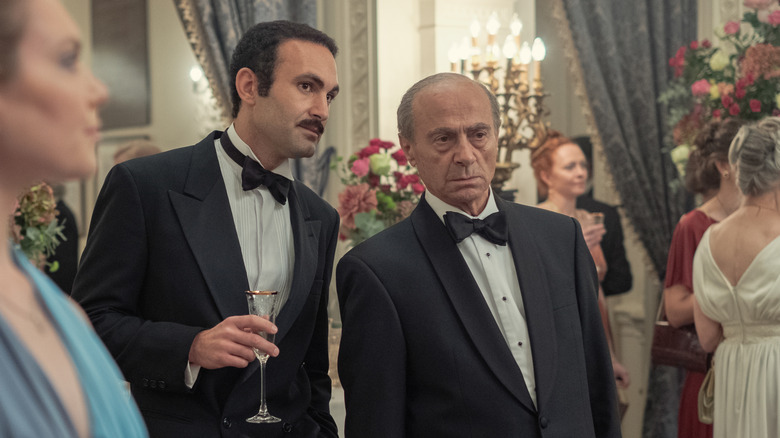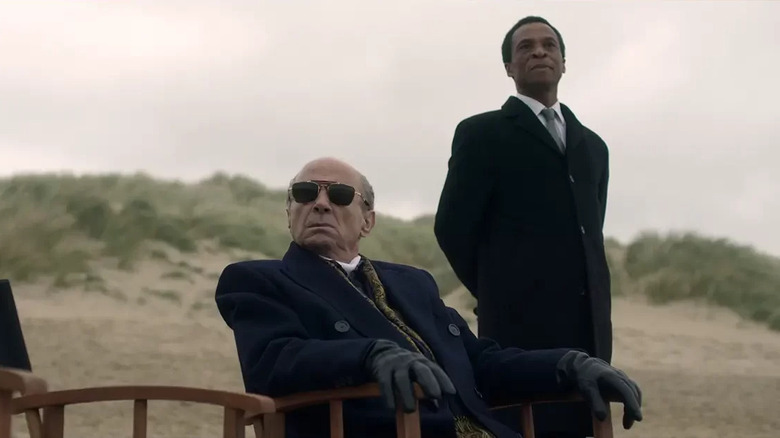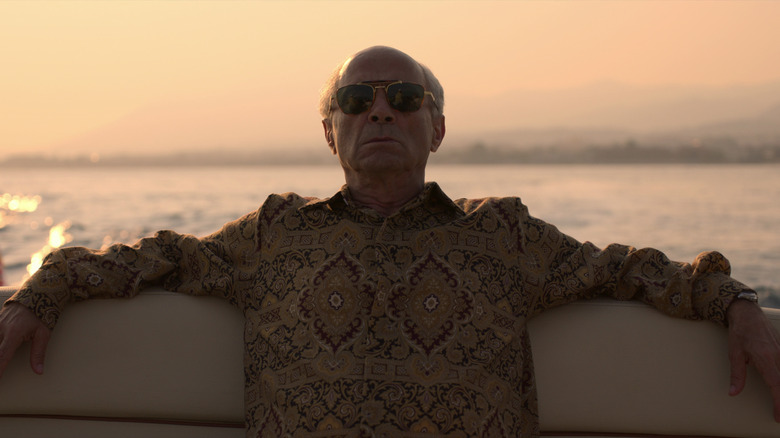The Crown Is At Its Best (And Worst) When Dealing With Royal Outsiders
The appeal of "The Crown" has never been limited to the glitz and glamor of the royal family. While the series certainly delivers on the promise of a glossy costume drama about a stuffy British monarch, its biggest strength has always been its effective approach to storytelling. Episodes of "The Crown" thankfully abandon the streaming TV refrain of being "more like a ten-hour movie" and instead deliver self-contained episodes that certainly connect, but are also a full meal on their own. And ironically, some of the best examples are the episodes that sidestep the royal family entirely, focusing on someone with little proximity to the titular crown.
In season 4's "Aberfan," we spend the opening minutes watching the morning routine of a small Welsh mining town. We'll later see the national fallout of the tragedy that befalls them. In season 3, "Fagan" was a series standout, tracing one of the most bizarre incidents in the queen's reign through the eyes of the perpetrator himself: house painter Michael Fagan. We learn how the depths of his divorce-fueled despair and the financial struggle caused by the Thatcher era led him to break into the queen's bedroom for an uninvited chat.
For the audience, leaving Buckingham Palace in favor of new characters is a bit of a relief. The royals live very insular lives and even when they forget, "The Crown" always reminds us that there's a world outside of them. Which makes it all the more ironic that the trend continues with season 5's "Mou Mou," centering an outsider trying to desperately weasel his way into the queen's orbit.
Mou Mou's humble beginnings
Where most episodes of "The Crown" revolve around royalty or members of the British establishment, "Mou Mou" traces the life of Egyptian self-made billionaire, Mohamed Al-Fayed (Salim Dau). His riches aside, Mohamed is an unexpected protagonist for this show because he's very much an outsider. When we first meet him, he's a kid in Alexandria, Egypt, selling coca-cola out of a cart. On the job, he catches a glimpse of Edward VIII, the abdicated king of England. While the sighting leaves him in awe, his father voices an overwhelming disdain for both the British and the Egyptians who revere them. But Mohamed is not dissuaded, arguing: "If we look up to their kings and queens as gods ... it's because they are."
Of course, if you know the name Dodi Fayed, then you know what this storyline is in service to. Eventually, Mohamed's son (played by Khalid Abdalla) will begin a love affair with the divorced Princess Diana and lose his life in the tragic car crash of 1997. But that's a tragedy for next season: this episode is about Mohamed. It's about the reverence for the royals and the disillusionment of trying to get close to them.
To Mohamed, the British royals are an aspiration. They are the epitome of power. Many decades later, the Anglophile will hire Sydney Johnson (Jude Akuwudike) for this very reason. Welcoming into his service the Bahamian man who served as personal valet to Edward VIII gets him closer to that dream — or so he thinks. In reality, no amount of money can buy that kind of status, at least not for Mou Mou.
Mohamed's story is one of the season's best episodes
Becoming a billionaire isn't enough, so Mohamed buys a majority stake in Harrods, the famous British department store that the royals patron. It doesn't help.
He tries attending a posh horse show that the queen enjoys, but spending a fortune on tickets still puts him many rows away from her.
Years later, he buys Edward VIII's Paris villa, refurbishes it, and names it in honor of House Windsor. He invites the queen to visit, but still no dice — in fact, she snubs him and sends staffers to collect some high-value items from the villa. Still, Mohamed still isn't deterred.
His final move is sponsoring another horse show, knowing that she will be expected to sit with him. But she rejects him once more and instead sends Princess Diana (Elizabeth Debicki). It's a wonderful moment: Mohamed and Diana have easy chemistry and a delightful conversation. Two disgruntled outcasts who recognize that they've been cast aside by the royals. After all, Diana doesn't really count (as Mohamed so casually jokes) and no matter how much money he spends, he won't be getting any closer to them than her.
This ends up being one of the smoothest episodes of a rather uneven season, shining a light on a different version of British wealth while giving the Fayed their own chapter before the oncoming tragedy. And even though it doesn't work out as Mohamed wanted, there's something naturally heartwarming about the outsider's triumph. It's a tale as old as time — he goes from selling soda to chatting with Princess Diana.
Triumph is the name of the game when watching Sydney and Mohamed forge their friendship, attend high society events and celebrate an Oscar win. But emotionally effective as all of that is, it's also much more complex than "The Crown" makes it seem.
But Mou Mou's perspective also falls short
The kinship between Mohamed and Sydney only comes about after he catches sight of the valet serving as a waiter on the opening night of his newly purchased Ritz hotel. Not wanting a Black server on the floor, he sends him away — but quickly changes his tune when he learns who Sydney once worked for. Mohamed makes the jump from contempt to cordiality and, eventually, to friendship. But only because Edward got there first.
The crux of their relationship is that Sydney can impart what he learned from Edward onto Mohamed. It results in a montage will all the classic flourishes of "The Crown:" Mohamed gets a crash course in becoming a British gent, including which authors to read, how long to spend on tea, and the importance of golf. It's the parasitic British empire at its finest — Mohamed's striving vs. the queen dismissing him after one glance at the man. But other than the initial contempt shown by Mohamed's father, none of that is engaged with any further.
So where do the outsiders fit into The Crown?
Sydney himself does hold some resentment for the queen, but even that is just on Edward's behalf. As for his relationship with the Nazi-sympathizing former king, we get the impression that he did his valet a favor, teaching him how best to roll his socks and pour tea. For his part, Sydney seems grateful. It elevates him to serve a royal and it assures him good work — but then again, how is it that after so long in Edward's service, Sydney becomes a server at the Ritz?
The episode glosses over the details, perhaps leaving us to assume that with the duke's death, he was left unemployed. But per The New York Times, Sydney Johnson still served the family afterwards, very briefly. Reportedly, the duchess was not sympathetic to Sydney's request for more time with his children (following his wife's death), so he sought work elsewhere. If this complicated his relationship with the royals he served, we don't find out; Sydney's role in the episode is limited to kindly remembering the duke and running Mohamed's makeshift finishing school.
And then there's the matter of Mohamed Al-Fayed: to "The Crown" his most important attribute is his obsession with the royals. The actual Al-Fayed is better known for his later penchant for conspiracy, not to mention the various sexual assault allegations levied against him. So there's the downside to how "The Crown" handles its royal outsiders; they get far less time for scrutiny or exploration, leaving us with just a passing glimpse before we return our focus to the dazzling royals.
"The Crown" season 5 is now streaming on Netflix.
